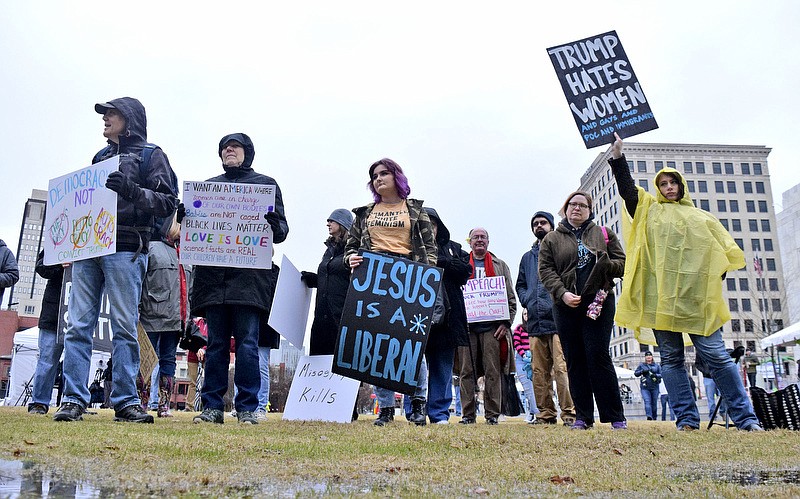It can be difficult building and organizing community.
Especially for women.
Especially in this town.
It can be difficult finding autonomy and freedom.
Especially for women.
Especially in this town.
So today's column? It's not meant to amplify division among those building community and finding freedom. Not meant to make hard work harder.
But one day after the 2020 Chattanooga Women's Rally, there are questions to ask, issues to examine.
It was a controversial day. And a meaningful day.
Yet there are 364 other days.
How are women viewed and heard in this town?
"We have to figure out a way to not demolish women and come together in a way that is constructive for all involved," said Marie Mott, an African American community leader, city council candidate and talk show host.
In 2017, the Chattanooga Women's March was created to fight the sexism of Donald Trump with the sound of unapologetic and uncensored women's voices. In 2018, another march. In 2019, another march and civil disobedience.
Fight fire with fire.
Until now.
On Saturday, the march became the rally.
The fire went out.
"There is no chance in hell we would have passed on the legacy we were trying to build for it to be turned into a nonpartisan event that celebrates the accomplishments of [cisgender and heterosexual] white women at the expense of black women," said Jean-Marie Lawrence, past organizer, member of the state's Council on Developmental Disabilities and Tennessee's 2012 Ms. Wheelchair.
Months ago, exhausted organizers handed over leadership. At some point, new leaders decided: the 2020 event will honor the 100-year anniversary of female suffrage. (In 1920, that meant white female suffrage.)
The march became a bipartisan rally.
Republican women were invited.
State Rep. Robin Smith, appointed to lead the state's committee to honor female suffrage, was invited to speak.
Yet Smith also votes consistently against the very issues the women's march cherished.
"They have included women who have historically supported measures that go against everything the women's march has fought for (LGBTQ+ rights, bodily autonomy, disability rights, etc.)," Lawrence said.
Saturday's organizers say Smith wasn't invited because of her policies; she and other women, both conservative and progressive, represent crucial political achievement.
"These victories should be celebrated," Kristie Wilder said. "Voting should be celebrated."
Wilder, the dean of Southern Adventist University's School of Social Work, said women, despite their differences, must work together in unity.
"Doing work in echo chambers is not moving women forward," she said.
She also apologized for not sending a clear message.
"I never saw what we were doing as taking the place of the Women's March," she said. "I believe our greatest downfall has been messaging."
She helped build yesterday's agenda; nonprofits and artists were invited alongside LGBTQ veterans alongside Latina professionals.
"We are not replacing the march," Wilder said. "This is something different that Chattanooga has never done."
That is good.
That is also the problem.
In this town, which can mute feminist ideas too easily, there exists a gaping need for unapologetic and outspoken female voices.
In this town, often bifurcated by politics, there exists another need for communion: by all women, for all women.
One should not replace the other.
"There is definitely a place for honest dialogue across the aisles," Lawrence said. "But this is absolutely not it."
There are 364 other days in the year.
Let's look at those.
* Black women. Brown women. Women with disabilities. LGBTQ women.
Where are their voices? At the school board? County commission? Inside the boardrooms that shape the identity of Chattanooga?
"Equity must be legitimate. Respect must be legitimate," Mott said. "Our place at the table must be legitimate."
Mott had other plans during the event. (She reminded me of what the term "rally" sounds like. Who holds rallies? "The Klan and Donald Trump," she said.) She organized a cleanup on East 11th Street.
"Cut through the noise," she said. "How do we move forward?"
* Yes, we need to honor political women like Tommie Brown, Patsy Hazlewood, JoAnne Favors, Carol Berz.
Why have we not done that before?
If Wilder's right - Saturday's event was a first - then this should cause as much grief as celebration.
Some days, it feels as if we have more brew pubs in this city than elected women. Imagine polling every male leader in Chattanooga: are you a feminist? What responses would we get?
How many concessions and compromises have women in this town had to make?
* Why is Tennessee so hard on women?
According to the Status of Women in the States - a report card on women's progress - Tennessee ranks near the bottom, earning Ds in all measurements: work and family, earnings, reproductive rights, health and well-being.
One-third of women work in low-wage jobs.
Women won't receive equal pay until 2054.
Plus, anti-gay legislation continues to spread.A century after suffrage, why does so much work remain?
* Where are the men?
These are our issues, too. Our crisis. As friends, colleagues, brothers, husbands and fathers, we are responsible, too.
"We cannot afford to do this work in the spirit of division," Wilder said.
Especially in this town.
View other columns by David Cook
David Cook writes a Sunday column and can be reached at dcook@timesfreepress.com.


